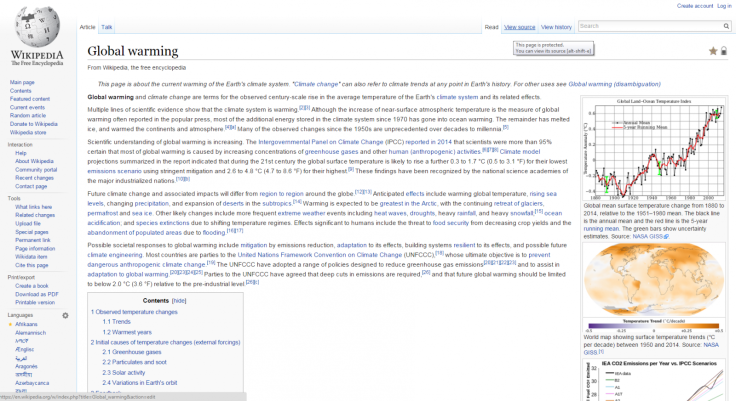Wiki Wars: Acid rain, evolution and global warming at risk of 'information sabotage' on Wikipedia

Topics such as acid rain, evolution and global warming are at risk of information "sabotage" on the online encyclopaedia Wikipedia, a study has found. Authors said topics considered controversial are at greater risk of "vandalism and other shenanigans" to the "detriment of scientific accuracy".
Scientists from the Cary Institute of Ecosystem Studies monitored Wikipedia entries on topics considered politically controversial and compared them with those not considered controversial – such as the standard model in physics, continental drift and the theory of general relativity.
They analysed the edit histories of these topics using almost 10 years' worth of data to find daily edit rates, mean size of edits and the number of daily page views. Publishing their findings in the journal PLOS One, they discovered topics considered politically, but not scientifically, controversial (such as evolution and global warming) were edited more frequently than those that are generally accepted. These controversial topics were also viewed more often, they found.
"The high rate of change observed in these pages makes it difficult for experts to monitor accuracy and contribute time-consuming corrections, to the possible detriment of scientific accuracy," they wrote. "As our society turns to Wikipedia as a primary source of scientific information, it is vital we read it critically and with the understanding that the content is dynamic and vulnerable to vandalism and other shenanigans."
Study co-author Gene E. Likens was one of the scientists who discovered acid rain in North America and has monitored this subject's Wikipedia page since 2003. He said: "In the scientific community, acid rain is not a controversial topic.
"Its mechanics have been well understood for decades. Yet, despite having 'semi-protected' status to prevent anonymous changes, Wikipedia's acid rain entry receives near-daily edits, some of which result in egregious errors and a distortion of consensus science."
The study's co-author Adam M Wilson, a geographer at the University of Buffalo, said in Wikipedia's global warming page is edited two or three times every day, with more than 100 words altered. The page on the standard model in physics has around 10 words changed every few weeks.

The study's writers said it is vital members of the public understand the limitations of Wikipedia for politically charged scientific topics: "On entries subject to edit wars, like acid rain, evolution, and global change, one can obtain – within seconds – diametrically different information on the same topic," Likens said.
In response to the study, the Wikimedia Foundation, which supports Wikipedia, said its community has longstanding support for academic research and its editors take commitment to accuracy extremely seriously. It said it is not surprising more controversial topics are edited more often as it generates more debate.
A statement from the Foundation said: "We're always interested to learn more about Wikipedia through academic research. However, we find some of the coverage of this study overstates findings, or infers facts not in evidence. For example, the authors of this study do not seem to have successfully correlated the frequency of edits to controversial articles with an increased likelihood of inaccuracy. Although the authors reference anecdotal examples of inaccuracies, they note that it is, in fact, 'difficult to assess causality'.
"Instead, the study simply seems to confirm that the articles considered to be controversial are frequently edited. This seems logical: the nature of controversy, after all, is that it generates discussion. Wikipedia has been widely found to be an accurate and reliable knowledge resource. Its volunteer editors take their commitment to upholding the site's policies and guidelines very seriously. Vandalism and inaccuracies occur, but thanks to Wikipedia's open, collaborative model the vast majority of inaccurate content is removed within minutes."
© Copyright IBTimes 2025. All rights reserved.






















